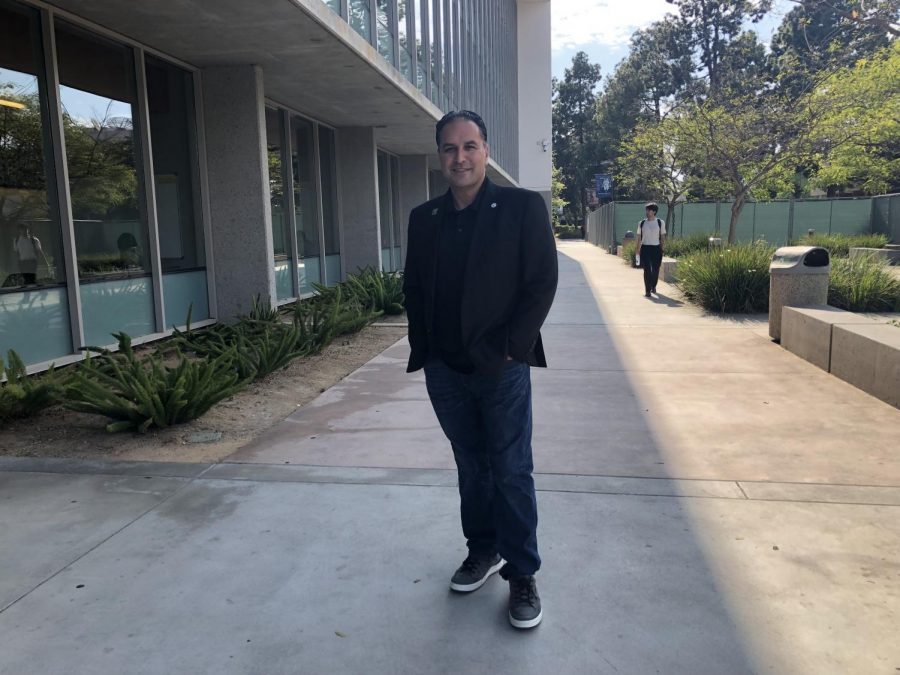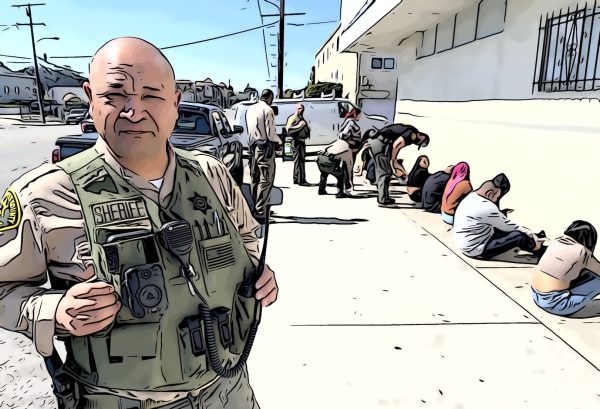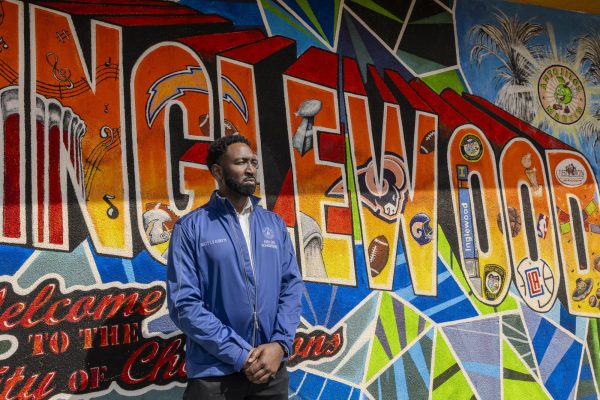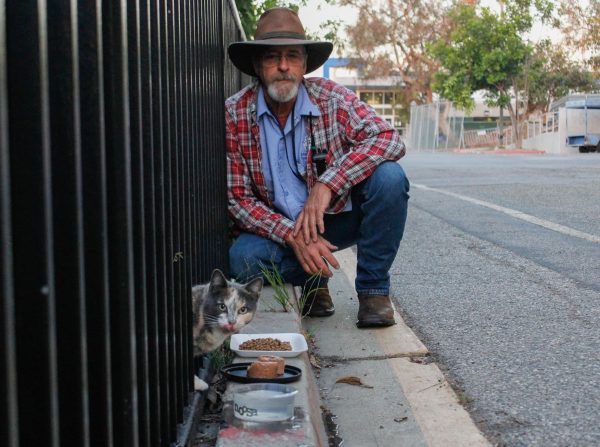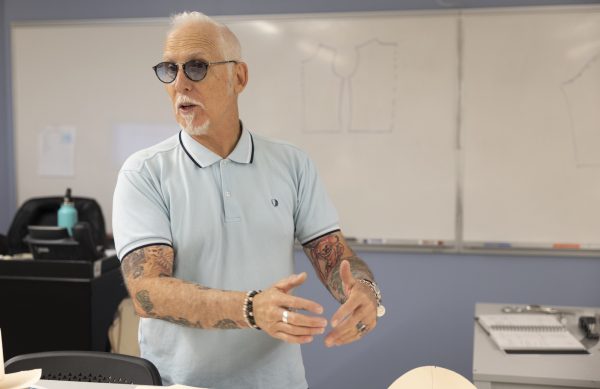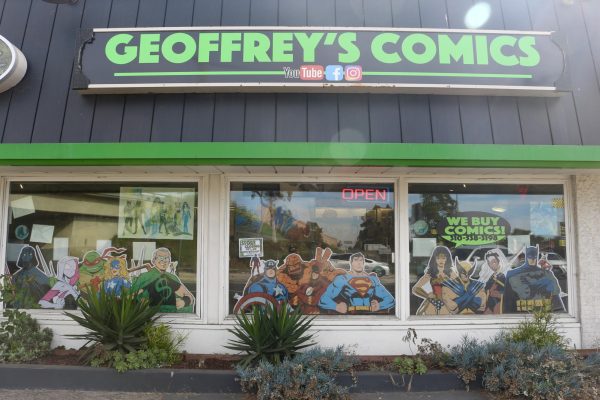Real estate professor creates a bond that will last a lifetime
Walking through a three-bedroom, two-bathroom home in Torrance with about 45 students from his appraising class, they enter an old-fashioned, Japanese-style room. The room’s size is big enough to be a bedroom but is small enough that only a full size bed and dresser can fit.
The room is set up with a small tatami mat in the middle with a red pillow on it, two red hanging lanterns and two dark brown sliding shoji doors, one connecting to the closet and the other to the sliding door to the backyard.
He’s dressed business casual in a white-button down shirt, unbuttoned from the top, a black blazer, dark blue denim jeans and dress shoes. Under six feet tall and light black hair.
John Yeressian, 40, is a real estate professor at El Camino College. He’s been teaching part-time at El Camino since spring 2016. John has taught real estate for 10 years in a reality office, where he trained new agents. He has a daughter, Alina 12-years-old and a son Yanny, four-years-old.
He became a full-time professor in fall 2018 when he took on his new role as head of the real estate program at El Camino.
During a Wednesday night class, he took his students out for assignment to appraise a newly sold home for homework.
“The house sold for $670,000? I wouldn’t offer anything more than $600,000,” a student says.
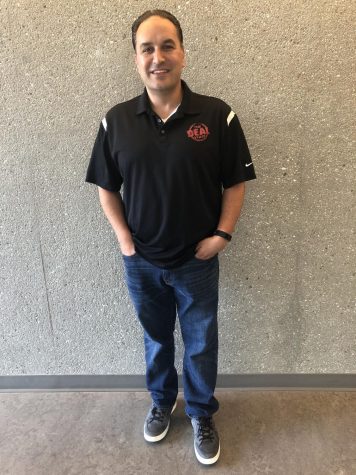
Selling homes and teaching at El Camino are not his only jobs, John and his brother, Vatche Yeressian, have a top 500 growing small-business, according to Forbes.
Their small-business company is called ‘The Deal Team’. They buy products in wholesale and sell them on amazon.
“My brother comes to me [in 2012] and says ‘I wanna start a business,’” John says. “The first year we made like $200 and thank god I was doing real estate because you can’t live off of $200 bucks and then you have to split it.”
They were selected by Forbes as one of top growing small-businesses because their sales have increased dramatically. In the third year they made $150,000 in sales then jumped to $250,000 followed up by $500,000. The last two years they have made a million dollars.
“We have seen exponential growth in the business in the last couple of years. It sounds cliché to say this but we started in the garage,” Vatche says. “Today, we are a multi-million dollar company but it took a lot of hard work to get there and we are still experiencing healthy growth.”
Vatche says some days are full of action and things are hectic like when there’s a product in high demand but have fill-rate issues. Other days run are smooth when it is time to just do packaging and un-packaging.
“Owning a business requires a lot of work, particularly in the first couple of years. Initially it takes a lot of work to get it going, but once it’s off and running it starts flowing smoothly,” Vatche says. “The complications that come with running a warehouse include shifting priorities, employee shortages, inventory shortages, equipment failures and meetings.”
John relates his business mindset to his and real estate mindset as they have the same niches to be successful.
“Running a successful business is the same thing as running a real estate business because you’re always buying and selling. Real estate if you’re investing you buy low, sell high,” John says.
“The same mentality I had from Real Estate, I’m able to carry that over to other business ventures.”
John has stepped out of his comfort zone throughout his life because running a business, selling real estate, and even teaching were never in his plans.
Born and raised in Pasadena, John went to Pasadena High School. When John was growing up the city was still changing and evolving and just like every city, it had its good side and not so good side of town.
John attended a private elementary school but his father was laid off and could no longer afford it. Going to a public middle school was a big change for John because at the time gangs were having an influence on the community.
“I didn’t know what the hell was going on so I’d just sit there and the people next to me would be like ‘ay can you help me with my math?,’” John says. “Then they’d be like ‘ay we’ll help you out, we’ll be your friends,’ I didn’t know what was going on.”
In high school, John had decent grades but no knowledge about college. One day his dad drove him down the street to Pasadena City College and told him to enroll.
“Why do people wanna go to UCLA if we have this right here?” John says. “I went to Pasadena City College and found out that you have to transfer. The counselor [told me] ‘you can’t stay here forever.’”
John was taking general education classes before he picked engineering as his major. It was not long before he found that engineering was not for him so he switched to biochemistry. He needed to pass five chemistry classes.
In his first class he received an ‘A’ and then a ‘B’ in his second. He was on his third chemistry class and had a ‘C’ in the class when his professor recommended he switch his major.
“Do you see the trend?,” his chemistry professor told him.
The professor recommended he switch majors because his grades were not getting better after each class.
“I was confused because it was the semester before I was going to transfer,” John says. “All my friends were business majors and I thought well you guys have a lot of free time so I switched to business and took all the business classes in the summer.”
After he completed all of the required classes for business in one summer, John transferred to California State University Northridge as a business finance major. He got an internship through the college as a stockbroker for Merrill Lynch. It was an unpaid internship that later became a job for him after graduation.
“I loved it so much because I was seeing stocks and bonds,” John says. “I was seeing how much people were making buying stocks and selling stocks. The guy I was working for was making a million dollars a year, just from commissions only.”
After his graduation in 2000, he packed his bags and moved to New York. Merrill Lynch paid him minimum wage for six months and after the six months, it was no pay and commissions only.
After the six months of being paid minimum wage he decided to leave and come home because working minimum wage was not going to help him payoff his student loans.
He moved back to California and worked as a staff accountant in an office with about 20 other staff employees. After sitting in a cubicle for two years receiving stock reports and accounting with limited days-off and tiring hours, John left to become a chief financial officer of a credit union.
He shortly left the credit union after he said the chief executive officer was committing fraud by asking John to sign off on using the bank’s money for his personal use.
John often received phone calls from a friend asking if he wanted to work with him for the Department of Army. John never gave it much consideration, until one day when his friend calls and John finally agreed.
He began working for the Army Corps of Engineering in its Environmental Department in 2002.
“This is where my real estate career started,” John says. “He kept asking me and at one point I felt so bad so I went over there.”
In the Environmental Department, John was responsible for issuing permits to investors that were building 500 homes at a time, John says. Another colleague noticed the way John went about his business and approached him to offer a job in the Real Estate Department in 2004.
This new job offer included a car, laptop and a raise but first he had to pass college level real estate courses, so he enrolled at El Camino.
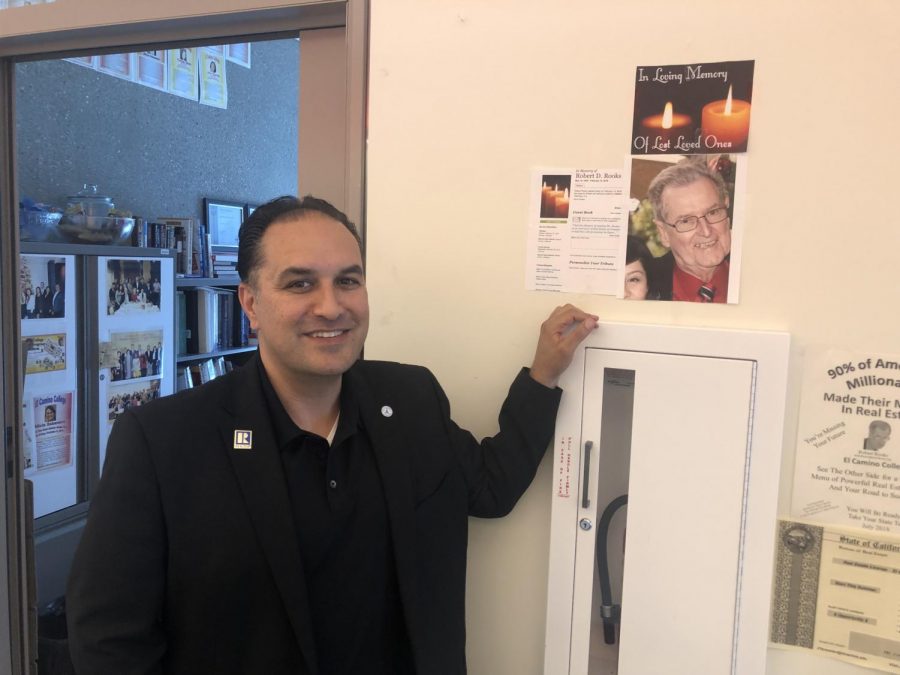
“I got a D my first time,” John says. “So I took it with Robert Rooks, Mr.Rooks. After the first two weeks of class I’m like ‘This dude is weird’. Like this is a weird professor.”
John though he was weird because how his class was structured and he was overly nice. John’s first impression of Robert was only that, a first impression because Robert became someone he looked up to relatively fast.
“He’s my mentor, like throughout life, when I met him we just connected,” John says.
John passed the two mandatory classes for work but continued taking all of the elective real estate classes with Robert. He had no intention of taking his real estate license because he did not need it for his job.
That changed when Robert called him one day and told him to take it. He took the test and did not pass the first time. Robert told him to take it again right away before he forgot the information and he passed the second time.
Once he got his real estate license in 2006, Robert began training him how to become a realtor. John then got his broker’s license in 2008.
“He had his own office called AVD Reality. In the morning I would do government stuff and then at night he would go and show me how to buy and sell regular homes,” John says.
Robert was no longer just a professor, he became a friend of John’s.
“We became friends for life and it wasn’t just real-estate, he would just call me like ‘Hey John, how you doing?’ you know, just to say hi. He would just invite me to lunch, introduce me to students, so I’ve always had a connection to El Camino because of my mentor in life,” John says.
Robert was also the person who got John into teaching, something that never crossed his mind.
He called John a few days before the spring semester started in 2016 and told him a teacher had quit but his classes were full.
“‘Hey John, I’ve already talked to the dean,’” Robert told John. “I didn’t know where he was going with this,” John says. ‘I’ve already spoke to the school, the semester starts in two days, you are going to come here and teach a class.’ Robert says.
John did not know how to respond because teaching was never in his plan but the college needed him on an emergency basis and he couldn’t tell his mentor no.
“He didn’t ask me, he told me to do it. In life sometimes I think that’s the approach, you gotta tell somebody to do it and not ask them if they want to. If he had asked me to do it I would’ve said no but he basically told me to do it so I had no choice,” John says.
Ting Chen, 30, real estate agent at Berkshire Hathaway, was a student in John’s very first class.
“When he [Robert] wanted John to get into teaching John was like ‘I don’t know anything about teaching,’” Ting says. “I was just taking the class to see what it was, I wasn’t motivated or think(ing) too much about it.”
When John started teaching, Robert sent him all of the PowerPoint slides and said he would help him go over the material to make it easier for him.
In those few days leading up to the start of the semester, John was thinking of every excuse in the book to give Robert as to why he could not teach the class.
“I was trying to think of ways to get me out of that situation,” John says. “Like a car accident, I died, I’m sick. All of those scenarios [were] going through my head I’m like, none of these are going to work. I can’t let him down.”
John says he had to relearn everything and he felt like he did more homework than the students. The only reason he decided to stay after the one semester of teaching is because of great student feedback he received. Students were asking him if he was going to teach again because they wanted to take his classes.
“[Robert left] a huge [mark on John] because at the time John was still kind of working other jobs,” Ting says. “Watching from when the very first time he taught to now he’s [head] running the real estate department, he’s really come far from when he started to now.”
Robert fully took John under his wing and started training him as a teacher.
“He was helping me improve [as a teacher],” John says. “He had been teaching for like 30 years. So he knew what to do and what worked and didn’t work. He said ‘If you follow my style you’ll be a successful teacher.’”
Robert won Professor of the Year at Compton College for the 2016 school year. Robert told John that if he wanted to become a successful teacher all he had to do was follow his success pattern.
Robert got sick in January 2018 while he was teaching winter session. He thought it was a cold or flu and called John to ask if he could sub a Friday class for him. John agreed, but received another phone call on Sunday asking if he could sub again, John got worried.
“He’s the type to never take an off day so for him to take multiple days off like that, it was unheard of. I didn’t get worried on the first day but then the second and third day, I started getting worried,” John says.
John and another professor ended up teaching the rest of the winter session class. Robert was supposed to come to class the last day and give the students certificates for passing the class. John received a call from Robert’s wife the day before the last day of winter session.
Robert had a stroke. Everything was ok, he was fine but he was in the hospital and was not going to make it to class the last day, she told him.
A few weeks before the spring semester started that same year, Robert was diagnosed with stage four leukemia. He had to recover from his stroke, pneumonia that was caused from laying down too much in the hospital and stage four leukemia, John says.
“It was just way too much. After they diagnosed him, I think they said he can live for like a week,” John says.
Robert died three days after his diagnosis. It was on Valentine’s Day 2018. John’s first day ever teaching was Feb 14, 2016.
“It was like the first week of school, I came out of a Wednesday class and my phone was ringing and I saw that it was his wife,” John says. “I was going to go visit him that day and she called me and said ‘You don’t have to come anymore, my love is gone.’”
Robert woke up on Valentine’s Day and told his wife he loved her. She asked him if he wanted a blanket from the car so she went to go get it. Within the two minutes she was gone, Robert had died.
“A bunch of thoughts went through my head, I was thinking like ‘Man, I’m going to quit teaching.’ Like I honestly didn’t want to teach anymore,” John says. “That’s why I’m at El Camino, because of him, I couldn’t say no to and disappoint him.”
Robert said John could be just like him with three to five years training. 2019 would have been the third year under Robert’s wing as a teacher and John is now the head of the Real Estate Department.
“The reason I’m here is because of Mr. Rooks. He changed my whole life,” John says. “The more I got to know him [and reflect], some professors say they like students but they don’t really, everything he did was because he loved the students.”


